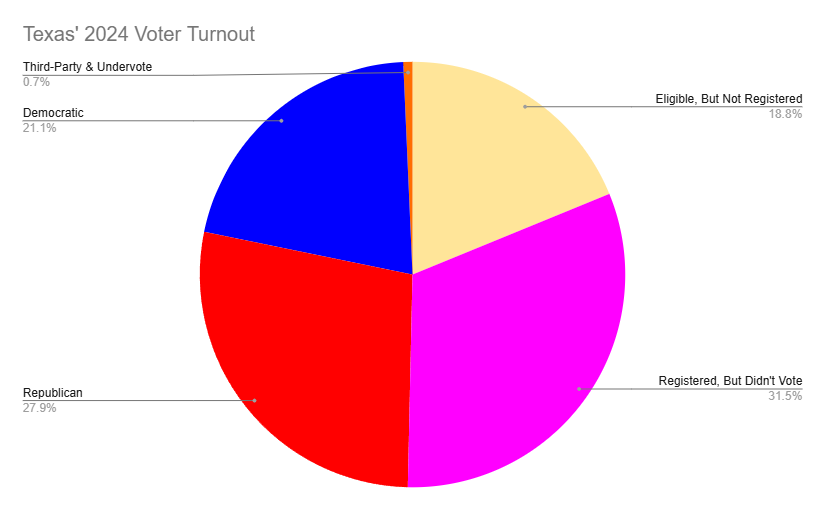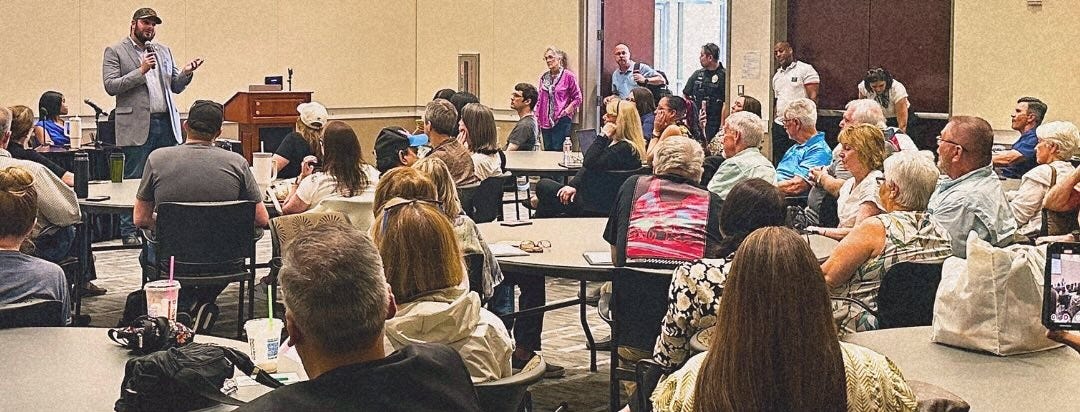You’re More Powerful Than You Think In Texas
Texas has the largest untapped electorate in the country.
It’s been a long, hard legislative session in Texas, and in just a few days, it’ll finally be over. That alone is enough to make you want to exhale. After months of watching extremist bills, performative cruelty, and billionaire-backed power grabs dominate the agenda, no one would blame you for feeling burned out. Add to that the chaos coming out of DC, and it’s easy to understand why people feel disillusioned.
But I haven’t given up on Texas. And I don’t think you should either.
Texas isn’t a red state. It’s a state full of people who have been discouraged, disenfranchised, and deliberately ignored. The problem has never been that Texas is too conservative. It’s that too many Texans are being kept from the ballot box.
According to an article from the Texas Tribune, voter turnout in the 2024 election actually decreased, despite record-high registration. That gap between who can vote and who does vote is where our power continues to slip away.
Texas is a non-voting state. And that’s what Republicans in power rely on.
You wouldn’t know it from the Capitol floor, but if you scroll through Republican Facebook groups or read their blogs, cracks are showing.
The rage isn’t just coming from Democrats anymore. It’s coming from their own base. The grassroots conservatives are furious at GOP lawmakers who’ve sold themselves to Tim Dunn and the billionaire boys’ club. They’re sick of performative nonsense. And they are livid about the THC ban.
I’ve been writing for years about how much money Texas is leaving on the table by refusing to legalize and regulate. And every time I say, “Texas will never see legal weed as long as Republicans are in charge,” someone pops into my inbox to say, “Well, Republicans like to get high too!”
Sure. But liking weed and protecting your freedom are two different things. And if you’ve been paying attention, Republican politicians are doing everything they can to crush liberty when it doesn’t serve their donors. Dan Patrick’s THC ban is proof. It’s so unpopular that Abbott is now under bipartisan pressure to veto it, but that didn’t stop a whole pack of Republicans from voting for it.
GOP voters don’t seem to notice the power grab until it hits them. Until it messes with their body, their business, or their access to medicine or relief. And now, finally, it’s starting to hit.
I post a lot of legislative clips on TikTok, and some of them go viral. Like the now-infamous exchange between Daniel Alders (R-HD06) and Ann Johnson (D-HD134), an unhinged, embarrassing spectacle that even Republicans in the comments remarked about how awful it was. People are waking up.
One of my most unexpected comment sections? A video I posted of James Talarico speaking in a committee. A self-identified Republican wrote, “I would never vote for a Democrat in a million years… but I’d vote for him.” That’s what visibility does. That’s what authenticity does. It cuts across party lines.
Democrats across Texas, like Sara Spector, are already calling for Beto to run again.
But there’s a larger issue here. Texas can’t afford to pin its hopes on one person.
The average Texas voter doesn’t follow every race. Many don’t vote at all. And that’s the real problem, not a lack of charisma at the top of the ticket, but a lack of visibility and presence across the board.
Two critical truths have to be acknowledged if Democrats want to turn the tide.
1. We need fifty Betos, not just one.
Democrats like James Talarico (D-HD52) and Jasmine Crockett (D-TX30) are successful because they show up. They speak with clarity, connect with voters, and stay visible in between elections, not just when it’s campaign season. That kind of consistency builds trust and recognition.
If Democrats are serious about winning in Texas, they can’t just parachute into a statewide race without doing the groundwork. That means running for the school board. For the city council. For the state House. It means building a base and showing up to neighborhood meetings. Earning the community’s trust long before the yard signs go up.
We’ve already seen what’s possible when Democrats show up consistently and speak directly to their communities. Leaders like Erin Zwiener (HD45), who flipped and held a rural/suburban seat, and Lina Hidalgo, who became a national example of what bold, competent local governance can look like. They didn’t rise through party machines. They won by showing up, being real, and building trust.
In cities across Texas, progressive candidates have quietly been winning city council and school board seats, often in places where Democrats hadn’t been competitive in years. These victories are proof that visibility works.
It’s great to have big political aspirations, but if the goal is real change, it starts at home.
2. None of this matters if Texans don’t vote.
According to a study from the Brennan Center, Texas’ voter suppression laws are working exactly as intended. They’re driving long-term disengagement, especially among voters of color. The chilling effect is real.
To counter that, we need a full-court press on civic engagement. Voter registration isn’t enough. Texans need to know when to vote, where to vote, and why it matters. And this work can’t be limited to the white suburbs. It has to reach the neighborhoods most impacted by these laws, the places where voter turnout has been systematically hollowed out.

In 2024, Texas’ voter turnout was less than 50%. Only 27% of our neighbors voted for Mango Mussolini, but 31% of our neighbors didn’t vote at all, despite being registered.
There’s a genuine reason for optimism when it comes to the direction of the Texas Democratic Party.
New state chair Kendall Scudder has hit the ground running. He’s been traveling across the state, meeting with county parties, rebuilding long-neglected relationships with grassroots organizers, and working to reconnect the state party with the local infrastructure it can’t afford to ignore.
The job ahead is massive. Scudder’s challenge isn’t just raising money or delivering flashy speeches. It’s building a durable foundation for victory in 2026 and beyond. That means recruiting candidates for every single state and federal race, filling open precinct chair seats, and making sure no Republican runs unopposed.
By his own words, Scudder wants to be judged at the next state convention based on how many precinct chair seats have been filled. And that’s a smart metric. Precinct chairs are the backbone of local turnout efforts. They’re the ones blockwalking, registering voters, and turning neighbors into voters.
According to the Texas Secretary of State’s current report, there are approximately 3,200 Democratic precinct chairs across the state, compared to roughly 4,200 Republicans. Closing that gap and surpassing it should be a top priority.
With 2026 on the horizon and the economy tightening, unemployment rising, and Trump’s circus continuing, it could shape up to be a major backlash election. But that only matters if the party is ready to meet the moment, with candidates, infrastructure, and energy in every corner of the state.
For those even thinking about running for office, this is the year to get serious. The field is wide open, and the stakes have never been clearer.
Texas has the numbers. Always has.
The majority of people in this state believe in freedom, fairness, and the right to live without government-sanctioned cruelty. But belief isn’t enough. The question has never been, can we flip Texas? The question is, will we?
Do we have enough people doing the work? Are enough candidates showing up early and often? Enough precinct chairs knocking on doors? Are enough organizers registering voters where it matters?
We’ve got incredible leaders in the trenches, candidates, elected officials, party chairs, activists, working their asses off every single day. But Texas has over 30 million people. That means we need more. And we need them to be viable. Visible. Vocal.
We don’t need saviors. We need teammates. Blockwalkers. Precinct organizers. First-time candidates. Voter education volunteers. People who care enough to act, not just post.
If every eligible voter in Texas showed up at the polls, we would win.
It’s in us. The power, the people, the possibility. We have to remind the rest of Texas that it’s in them, too.
June 2: The 89th Legislative Session ends.
June 3: The beginning of the 2026 election season.
Click here to find out what Legislative districts you’re in.
LoneStarLeft is a reader-supported publication. To receive new posts and support my work, consider becoming a free or paid subscriber.
Follow me on Facebook, TikTok, Threads, YouTube, and Instagram.





I am exhausted, knocking on so many doors, no one has ever knocked on these doors. And I am unleashing voters and guess what else, in 2 days I have recruited 3 precinct chairs and 2 block walkers right out of the door. Why? Because I talked to them about what mattered and made this election about them. I have so much to say both good and bad about what is happening in my City in this run off. We have 77 precincts. And we have 6 precinct chairs actually lifting more than a finger. I have not even been sworn in and I am working so many doors. Why? Cause I actually know what the fuck a precinct chair is supposed to do because I learned it from Kelly Blackburn, the Democratic chair in Ellis County, and a very special man that I met two weeks ago has helped me focus my energy on what actually works.
Michelle. I will be very blunt with you. The momentum doesnt mean anything if democratic officials and politicians think its appropriate to sell off their values in order to save their careers or adopt far right talking points. I am starting to see that so often that it is quite difficult to even keep hope. I will be direct where i say if i ever see Kendall or any of the democratic officials that think its appropriate to throw any communities under the bus simply to court the mythical moderate republicans and independents i will never forgive you all. This was a hard lesson in 2024 and i expect everyone in Texas understands that you cannot take any of our communities for granted and abandon them.